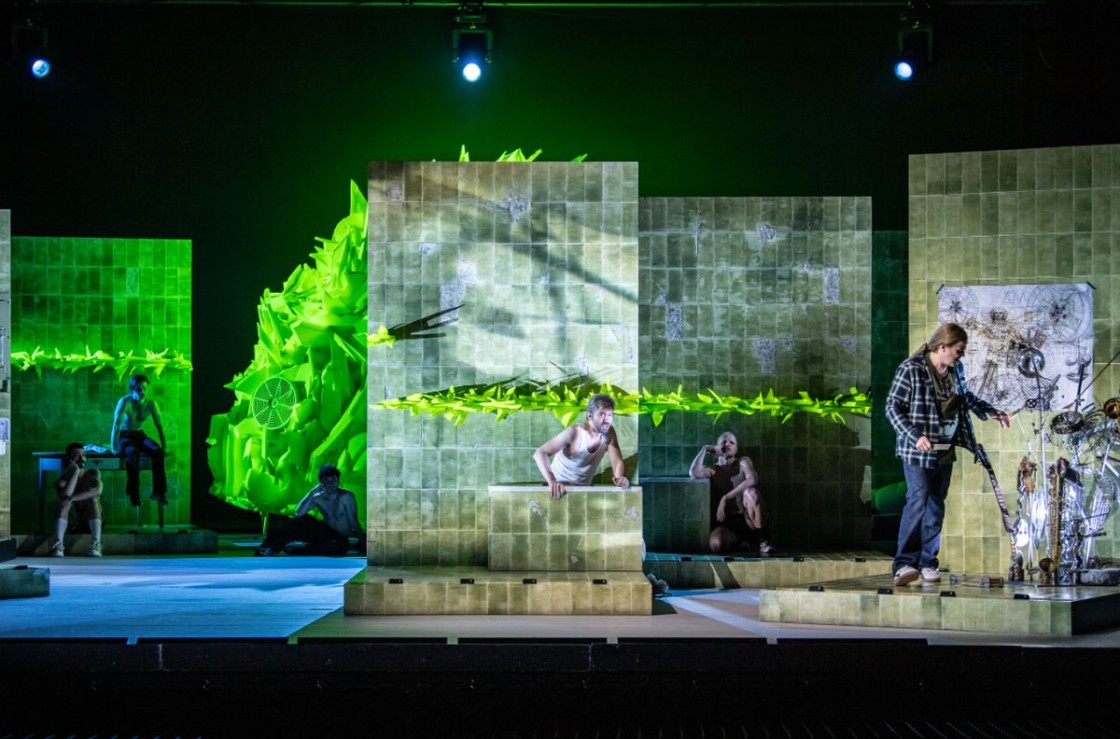Radically feminine. How Ewelina Marciniak reinterprets classic reinterpreted from a feminist perspective
Her consistently feminist approach also reveals deficits in the theatre system. After all, femininity is still too rarely emphasised in stage language. Female directors still have a hard time. (…) It takes courage to say no and go against the mainstream, and her feminist approach causes friction in Polish society, which is characterised by Catholicism. The artist, who has a strong personality, does not shy away from these debates.– writes Elisabeth Maier at „Theater der Zeit”.
In the moss-green panelled kitchen, Siegfried argues with his foster father Mime. In this limited world, the dwarf wants to raise the adolescent to be a hero. But his attempts to instrumentalise the high-spirited boy for his own purposes fail. Wearing a fine ribbed shirt and old baggy trousers, Thomas Ebenstein stands on the old electric cooker as Mime, thirsting for power. Director Ewelina Marciniak dismantles the false father figure by allowing the comically gifted tenor to openly display his malice.
With ‘Siegfried’, the Polish director has staged her third Wagner opera at Bühnen Bern after ‘Rheingold’ and ‘Die Walküre’. In 2025, she will stage the fourth and final part of the ‘Ring of the Nibelungs’ at the sophisticated Swiss opera house high above the River Aare: ‘Twilight of the Gods’. In ‘Siegfried’, she liberates the monumental work from the heroic myth and allows the characters to be human bings. Jonathan Stoughton develops his German hero as a young man who has yet to find his way. Both in love and in life, he is still missing a lot. Marciniak locates him in the reality of her audience's lives. With her costumes, Julia Kornacka manages the balancing act between modern everyday fashion and fantastic elements. Patricia Westley in the role of the forest bird wears a delicate animal costume.
In theatre, Marciniaks has made a name for herself primarily with female characters who have to assert themselves in the world of men. With her production of Schiller's pathetic tragedy ‘The Maiden of Orleans’ at the Mannheim National Theatre, she was invited to the Berlin Theatre Meeting in 2022. Together with dramaturge Joanna Bednarczyk and translator Olat Kühl, she reduced the classic play, which many consider unplayable, to its essential motifs and rewrote it.
How can this problematic female figure, which in Schiller's work is an ossified male construct, be interpreted today? Marciniak dissected the character into many different lives from different centuries. Together with the ensemble, she traced the Johannas of today, who have to assert their place in the world of men. In the production, the viewpoint of two actresses shows how intensively she constantly thinks about her contemporary experience.
The younger actress, Annemarie Brüntjen, interprets her role from a critical distance. She is too far removed from the reality of life today.
The older actress, Ragna Pitoll, is proud to have played ‘Johanna’ herself and to have fallen in love in the process. That was the dream of many actresses decades ago. From a feminist point of view, Marciniak dismantles the image that theatre history has imposed on the Maid of Orleans for centuries.
Her consistently feminist approach also reveals deficits in the theatre system. After all, femininity is still too rarely emphasised in stage language. Female directors still have a hard time. Even the quotas at the Theatertreffen and the #MeToo movement are only tentatively breaking down cemented thought patterns. In her ‘Johanna’, Marciniak questioned centuries-old clichés of the ‘virgin fighter’. The young mother is currently experiencing for herself that women face many obstacles, especially in the theatre business. Her calm, firm voice sounds combative in conversation. She wants to ‘give women a voice’ so that family and artistic work can be reconciled for everyone. She emphasises that the stages have a lot of catching up to do in practice. (…)
Ewelina Marciniak has long been a star director in Poland. She has maintained her stance, especially in times when Polish society has increasingly moved into the right-wing conservative corner, which is not easy because critical female artists have been fighting repression in the country for years. It takes courage to say no and go against the mainstream, and her feminist approach causes friction in Polish society, which is characterised by Catholicism. The artist, who has a strong personality, does not shy away from these debates.
In 2017, Freiburg artistic director Peter Carp brought Marciniak to the German theatre. At that time, she staged William Shakespeare's ‘A Midsummer Night's Dream’. The theatre man has made a name for himself as a discoverer of young talent, and was also spot on with her. In Germany, Marciniak quickly made the leap to the major theatres. She was awarded the German theatre prize DER FAUST in 2020 for her production of the play ‘Der Boxer’, based on the successful novel by Polish writer Szczepan Twardoch, at the Thalia Theatre in Hamburg. At the Salzburg Festival in 2022, she staged ‘Iphigenia’ on Perner Island in the salt mining town of Hallein in a version by Joanna Bednarczyk, loosely based on Euripides and Goethe.
Women's fates interest Ewelina Marciniak. In September 2023, she staged Elena Ferrante's ‘My Ingenious Friend’ at Hamburg's Thalia Theatre, focusing on the fourth part of the play. With the actresses of the Hamburg ensemble, whose work she has followed for a long time, she succeeds in creating sharp, complex portraits. The story of the two different friends Lila and Elena is brought to a head by the director, who focuses on the conflicts in the male-dominated Italian society. (…)
Ewelina Marciniak reflects femininity in her directing work. She takes a stand without appearing dogged. Her humorous undertone takes the leaden weight out of even tragic subjects. Her theater challenges people to engage in discourse. The portraits of people are touching. Feminist criticism and sensuality are not a contradiction for the artist. Quite the opposite. In Marciniak's theater language they belong inseparably together.
